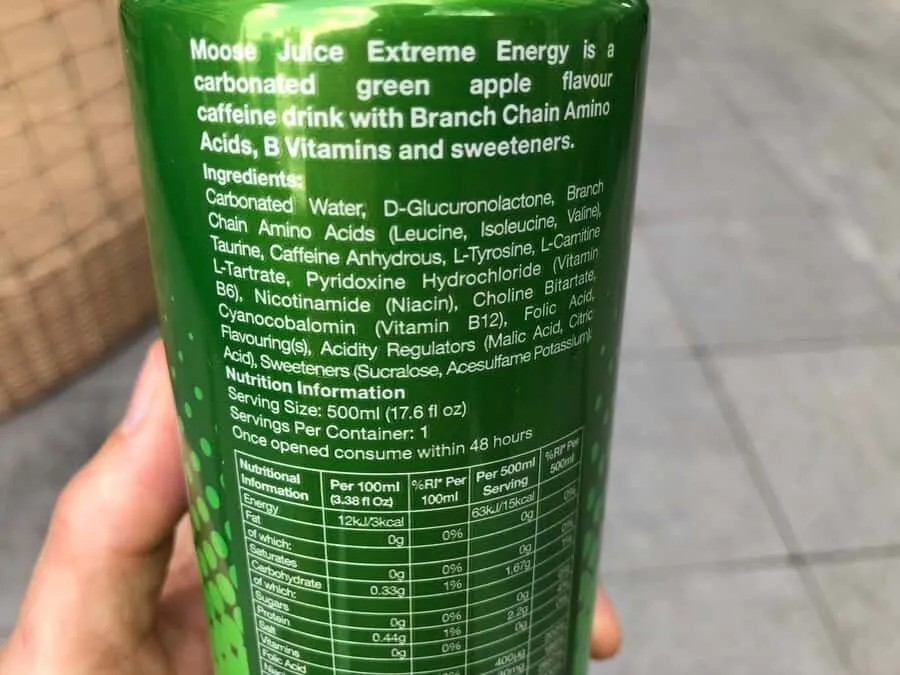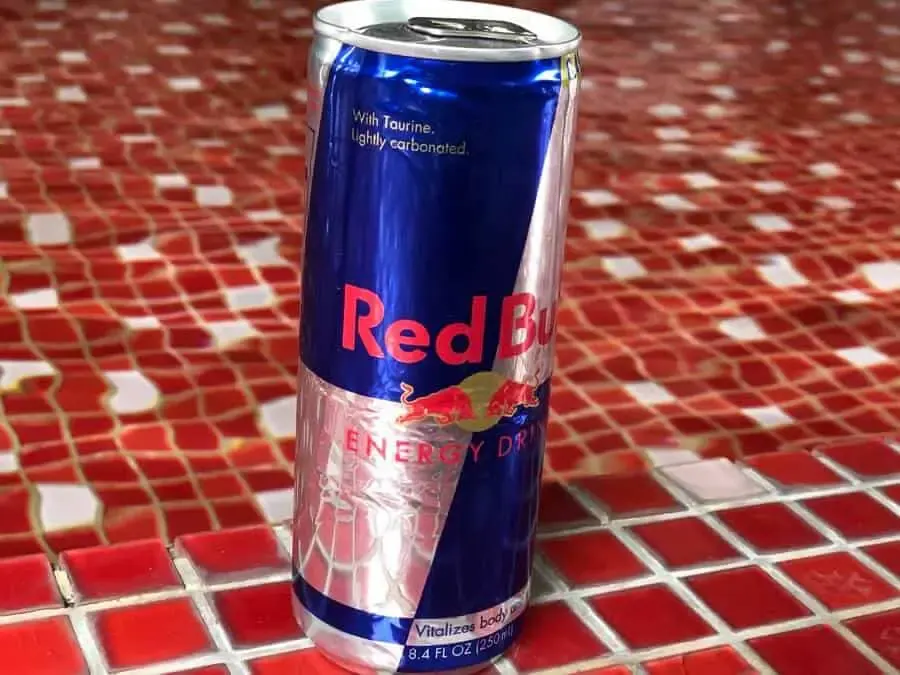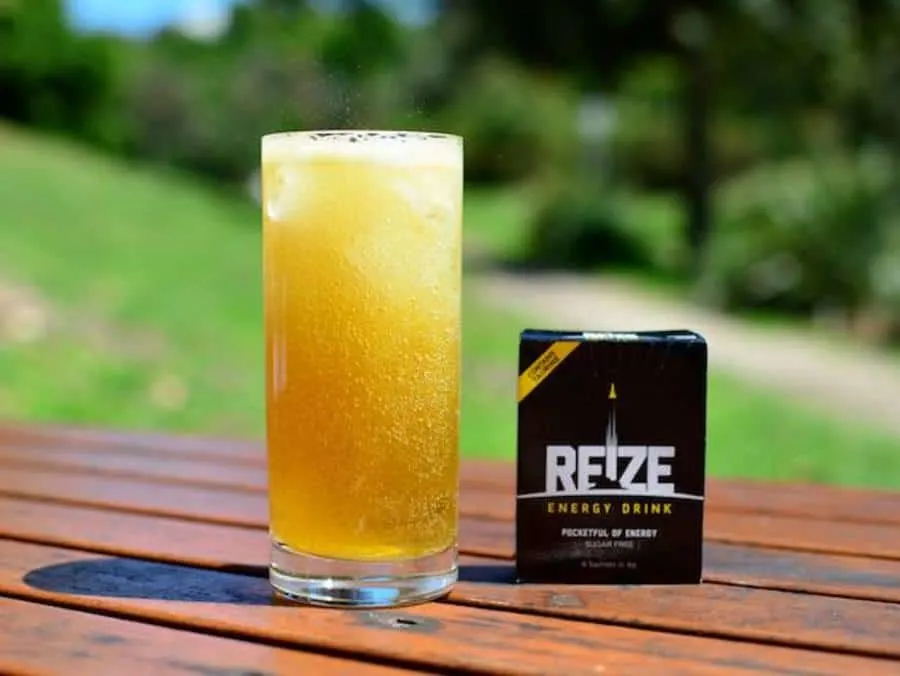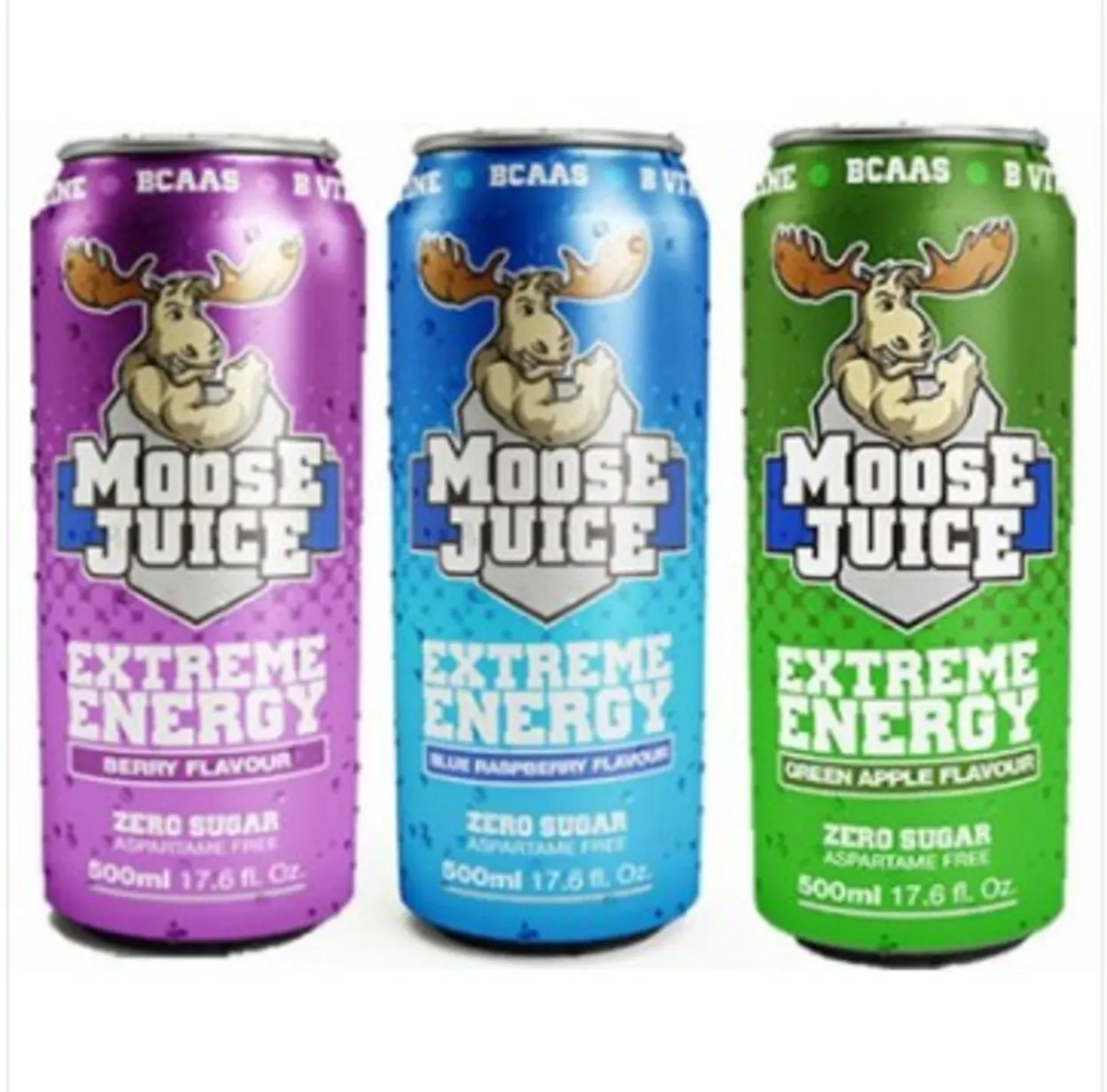To cut to the chase, Moose Juice contains 200 mg of caffeine, 15 calories, BCAAs, B vitamins, and other energy-boosting properties.
In this article, we’ll be taking a closer look at the ingredients in Moose Juice energy drinks and their possible effects on your health.
Moose Juice is an energy drink brand manufactured in Ireland owned by Muscle Moose and the parent company is Harper Innovations.
Aside from energy drinks, Muscle Moose also released an energy-shot brand and a variety of protein-based snacks.
Let’s go ahead and find out what ingredients are in Moose Juice Energy!
Moose Juice Ingredients

Each 500ml (17.6fl.oz) can of Moose Juice has the following ingredients:
- 15 calories
- 200mg of caffeine (a tad on the high side in my opinion)
- Carbonated water
- D-Glucuronolactone
- Branch Chain Amino Acids (Leucine, Isoleucine, Valine)
- Taurine
- Caffeine Anhydrous
- L-Tyrosine
- L-Carnitine
- L-Tartrate
- Pyridoxine Hydrochloride (Vitamin B6)
- Nicotinamide (Niacin)
- Sucralose (Artificial sweetener)
- Cholin Bitartate
- Acesulfame Potassium (Artificial sweetener)
- Cyanocobalomin (Vitamin B12)
- Folic Acid
- Flavourings
- Malic Acid (Acidity regulators)
- Citric Acid (Acidity regulators)
| Nutritional Breakdown | Per 500ml Serving | %RI* Per 500ml |
| Energy | 63kJ/15kcal | |
| Fat | 0g | 0% |
| of which: | ||
| Saturates | 0g | 0% |
| Carbohydrate | 1.67g | 1% |
| of which: | ||
| Sugars | 0g | 0% |
| Protein | 2.2g | 4% |
| Salt | 0g | 0% |
| Vitamins: | ||
| Folic Acid | 400µg | 200% |
| Niacin | 30mg | 188% |
| Vitamin B6 | 40mg | 2857% |
| Vitamin B12 | 500µg | 20000% |
*Reference intake of an average adult (8400kJ/2000kcal)
Note: Nutritional facts and ingredients could vary slightly between flavours of Moose Juice.
How much caffeine does Moose Juice have?
Moose Juice contains 200mg of caffeine per can.
At 200 mg, the caffeine content of Moose Juice makes it one of the stronger energy drinks available on the market and puts it among some highly-caffeinated energy drinks like Bang, Monster, and Celsius.
This is half of the daily limit of caffeine consumption, which is 400mg according to the EFSA, thus you’re not advised to have more than one can of Moose Juice in a day.
Plus, I assume Moose Juice won’t be the only drink you’ll have all day. You’re sure to have foods and other drinks that might contain caffeine too. If you go overboard with caffeine, you might suffer a caffeine overdose, which is no laughing matter.
You also need to be careful if you have any pre-existing medical conditions. Before making the decision to drink Moose Juice, consult your doctor.
You should take note of your caffeine tolerance as everyone has different responses to large doses of caffeine.
Some of the possible side effects of caffeine are:
- Headache
- Dehydration
- Faster breathing
- Faster heart rate
- Irregular or fast heartbeat
- Shakiness
- Vomiting or feeling sick
- Confusion
- Panic attack
Does Moose Juice contain sugar?
Moose Juice is completely sugar-free, but it does contain artificial sweeteners, sucralose, and acesulfame potassium (ace-K).
Sucralose and Ace-K are often used in place of sugar to enhance the taste and flavouring of energy drinks.
These sweeteners usually undergo a strict safety assessment by the European Food Safety Authority (EFSA) before it’s used in food and beverages.
Though there are many conflicting studies on the effects of artificial sweeteners, some studies have found that consuming artificial sweeteners may decrease hunger and calorie intake.
A 2014 study conducted on 303 participants found that those who consumed non-nutritive sweeteners experienced less hunger and lost more weight than the participants who consumed only water.
Another study reported that people who consumed diet beverages significantly reduced their intake of caloric beverages and desserts.
Although artificial sweeteners may seem beneficial, they have been linked to cancer in the past. Over 30 human studies have been conducted and so far, evidence that artificial sweeteners could cause cancer hasn’t been found.
Nevertheless, it doesn’t mean that artificial sweeteners don’t have potential side effects. Some people could have allergic reactions or be sensitive to the ingredients involved in making these sweeteners.
Those who have certain illnesses or medical conditions should also be careful when consuming artificial sweeteners.
Like most modern chemicals, the long-term effects of artificial sweeteners have yet to be fully established as there aren’t enough studies about them.
Even though artificial sweeteners are approved for use, you should still be mindful of your daily consumption.
If you want to reduce your sugar consumption or lose weight, the best way is to have a balanced diet and practice a healthy lifestyle by exercising and making sure you get enough rest.
Does Moose Juice have any calories?
Moose Juice contains 15 calories from the BCAAs in it.
This amount is quite small, so it won’t have too much of an impact on your weight. As long as you’re active and healthy 15 calories isn’t to worry about.
The body needs calories for energy and the amount you’ll need depends on factors like age, sex, level of activity, and overall health.
According to the NHS, the recommended intake of calories is 2000 for women and 2500 for men.
How much caffeine is in the Moose Juice shot?
A 60ml Moose Juice energy shot contains 200mg of caffeine.
As you can see, 200mg of caffeine is still within the limit however it could be too much for someone with low tolerance.
My preference would be 50 to 100mg of caffeine per serving which guarantee zero side effects. In that case, a shot of Moose Juice is too much for me. But that’s just me.
What are the ingredients in Moose Juice energy shots?
Here’s a quick rundown of Moose Juice energy shots ingredients:
- Carbonated Water
- Citric Acid
- Taurine
- Flavourings
- Guarana Extract
- Aspartame Steviol Glycosides
- Inositol
- Vitamins (Niacin, Pantothenic Acid, Vitamin B6, Vitamin B12),
- Sodium Benzoate
- Caffeine
Can one can of Moose Juice energy drink kill you?
Drinking one can of Moose Juice will not kill.
However, you might experience the downsides of caffeine if you’re tolerance to the stimulant is fairly low.
As long as you keep your intake within the limit and you always mind your tolerance level, Moose Juice Energy is not bat at all.
Moose Juice Energy is openly sold by many stores and so far there aren’t any reports regarding toxicity.
Still, it’s important to consume Moose Juice and other energy drinks responsibly. If you’re new to the world of energy drinks, I suggest you start with something that has low caffeine such as REIZE Energy.
What are the side effects of Moose Juice energy drinks?
Like other energy drinks, Moose Juice energy drinks can lead to possible adverse effects and health risks when overconsumed.
Here are possible side effects of Moose Juice Energy:
- palpitations
- restlessness
- insomnia
- headaches
- nausea
- vomiting
- breathing difficulty
Where to buy Moose Juice Energy?
If you live in the UK, you can probably find Moose Juice energy drinks at your local supermarket.
If you’re located elsewhere, Moose Juice energy drinks can be purchased via their official website. You can also search online retailers like Amazon and Dolphin Fitness.
The price for a can of Moose Juice energy drink is around £0.89 – £2, depending on where you purchase them.
Moose Juice vs Red Bull

Caffeine
A can of Red Bull has 80mg of caffeine, while Moose Juice contains 200mg of caffeine per can.
Both Red Bull and Moose Juice contain caffeine levels that are within EFSA’s recommended daily caffeine intake (no more than 200mg of caffeine per serving, 400mg of caffeine in a day).
If you’re new to energy drinks or prefer energy drinks with a milder caffeine dose, Red Bull is the one for you.
Sugar
Red Bull contains 27g of sugar while Moose Juice is sugar-free and has artificial sweeteners instead, which makes Moose Juice a healthier option.
Red Bull’s sugar content is still within the limit of daily sugar consumption since according to NHS, the average adult should consume less than 30g of free sugars daily.
Price
For comparison purposes, the prices are based on the price listed on Amazon. Of course, they may vary depending on where you purchase them.
A can of Red Bull is around £1.89 while Moose Juice costs around £1.50 each. These prices exclude delivery charges.
In terms of comparison, Moose Juice is a slightly cheaper option.
Moose Juice vs Relentless
Caffeine
Relentless Energy has 160mg of caffeine per can whereas Moose Juice contains 200mg of caffeine in each can.
If you consume either Relentless or Moose Juice, you’ll still be within the range of EFSA’s caffeine intake per serving, which is 200mg of caffeine.
However, you need to be more careful with your consumption of Moose Juice as its caffeine content is higher. Still, you run a slightly higher risk of having too much caffeine with Moose Juice than you do with Relentless.
Sugar
Moose Juice substitutes sugar with artificial sweeteners while Relentless contains 24g of sugar.
If you’re trying to reduce your sugar intake, Moose Juice might be the better choice between these two brands.
Price
From what I found on Amazon.co.uk, Relentless is around £1.66 for each can, whereas Moose Juice energy drink retails for around £1.50 per can.
Assuming delivery charges are not a concern, then Moose Juice is the slightly cheaper option of the two.
Moose Juice vs REIZE
Caffeine
To compare REIZE and Moose Juice, we’ll have to go with the assumption that you’ll be mixing one sachet of REIZE with 250ml of water.
With this in mind, we can see that a can of Moose Juice offers 200mg of caffeine per 500ml while REIZE supplies you with 50mg of caffeine per 250ml drink.
If a stronger kick of caffeine is what you want, then Moose Juice is the better option. If not, then REIZE is the energy drink you can choose to ensure your caffeine consumption stays within a sensible range.
Sugar
Both REIZE and Moose Juice are sugar-free.
In terms of sugar content, both REIZE and Moose Juice are great options if you prefer sugarless energy drinks.
Price
Moose Juice costs around £1.50 per can excluding delivery charges while REIZE is only around £1 per drink, including delivery right to your door.
Alternatives to Moose Juice Energy Drink
Aside from the brands we discussed above, you can also check out these other options:
You may also want to give powdered energy drinks a try too:
REIZE Energy Drink (10 out of 10)

REIZE is a convenient and versatile powdered energy drink.
In addition to being sugar-free and containing a reasonable amount of caffeine, REIZE is rich with energy-boosting ingredients like taurine, ginseng, and B vitamins that all combine to give you the perfect energy boost, without the crash.
REIZE comes in convenient 4g sachets, making them easy to carry around and are highly customisable, as you can mix a sachet with almost any beverage you like, including juice or water.
Furthermore, REIZE costs only about $1 per drink, and that’s inclusive of delivery fees.
That’s incredible value for money.
Give REIZE a try and I’m sure you’ll soon agree with me that it’s a great alternative to Moose Juice.

